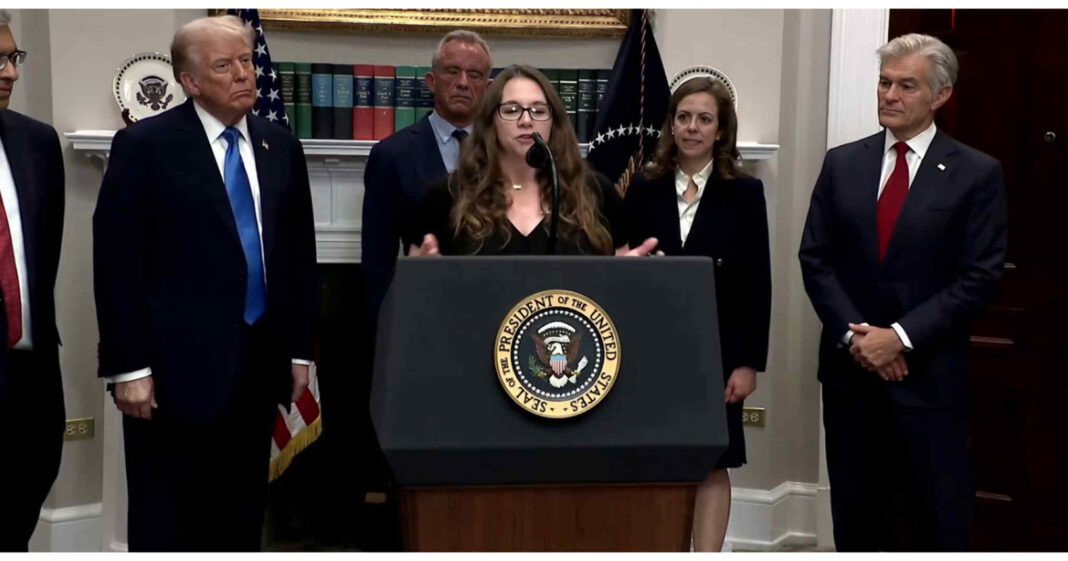President Donald Trump, joined by Health and Human Services Secretary Robert F. Kennedy Jr. and top health officials, spotlighted new efforts to confront what they described as the cause of the nation’s growing autism and ADHD crisis.
The president called for greater transparency on medications like Tylenol, urged changes to the childhood vaccine schedule, and highlighted the administration’s approval of a prescription treatment he said offers hope to affected families.
“We’re giving these little babies massive shots, like you’re shooting up a horse,” Trump told reporters. “We need to take a serious look at spacing them out.” He added, “Tylenol during pregnancy and administration of Tylenol to infants is dangerous.”
Trump announced that the FDA will add a warning on Tylenol for pregnant women and infants, along with removing mercury and aluminum from the vaccines.
President Trump explains the use of Tylenol and vaccines, and he also explains that mercury and aluminum are being taken out of vaccines.
Trump framed the initiative as part of a broader promise to “put families first” by re-examining long-standing assumptions in medicine. “We’re not going to ignore parents. We’re going to listen, we’re going to look at the science, and we’re going to tell the truth,” he said.
In addition to warning about Tylenol and promising new research on vaccine timing, the administration announced that leucovorin (folinic acid) is now approved by the FDA for use in children with cerebral folate deficiency, a rare metabolic disorder that can cause autism-like symptoms. The drug, officials said, will be covered under Medicaid and CHIP programs nationwide, ensuring that families who need it can access it.
Leucovorin, also known as folinic acid, is a medication that is a form of folic acid, an essential B vitamin. It is often used to “rescue” healthy cells from the toxic effects of certain chemotherapy drugs, primarily methotrexate.
FDA Commissioner Dr. Marty Makary said the agency is moving quickly to act on both fronts. “We are updating the label on acetaminophen so doctors and mothers understand the risks, and we are sending guidance to every physician in America,” Makary said. On leucovorin, he added, “Hundreds of thousands of kids will benefit from this approval. This is about giving families hope, and it is long overdue.”
FDA Commissioner Dr. Marty Makary is introduced and speaks at the press conference, explaining the success of leucovorin for the treatment of children with autism.
“This is a breakthrough,” Trump declared. “For years, families were told there was nothing that could be done. Now we have a treatment that can help children speak, communicate, and live better lives. It may not be for every child, but it proves what we’ve been saying — there are answers out there if we’re willing to look.”
Dr. Mehmet Oz, who heads the Centers for Medicare & Medicaid Services, emphasized that access to treatments like leucovorin must go hand-in-hand with continued scientific inquiry. “We have to look at the total picture. Parents want clarity, not controversy. If there are signals in the science, we can’t just ignore them,” Oz said. “Leucovorin is one piece of the puzzle — it won’t cure autism, but for the children, it helps, it’s life-changing.”
Health and Human Services Secretary Robert F. Kennedy Jr. echoed Trump’s concerns, promising a wider investigation into possible environmental triggers of autism. “We need to investigate the environmental causes of autism, whether it’s medications, chemicals, or toxins. Families deserve answers,” Kennedy said. “This administration will fund research to find out which exposures are harming our children. We’re not going to sweep this under the rug anymore.”
Health and Human Services Secretary Robert F. Kennedy Jr. speaks about the links to autism.
At the center of the debate is the Boston Birth Cohort study, published in JAMA Psychiatry in 2019. Researchers at Boston Medical Center analyzed umbilical cord blood from nearly 1,000 babies born at the hospital, measuring acetaminophen and its metabolites at birth. They divided the children into three groups based on exposure levels. The results were striking:
-
Children in the middle exposure group were about twice as likely to later be diagnosed with autism or ADHD compared to those with the lowest exposure.
-
Children in the highest exposure group were 3.6 times more likely to be diagnosed with autism and 2.9 times more likely to be diagnosed with ADHD.
Lead author Yuelong Ji summarized the findings: “Cord biomarkers of fetal exposure to acetaminophen were associated with significantly increased risk of childhood ADHD and ASD in a dose-response fashion.” The research team concluded that “these findings support previous studies regarding the association between prenatal and perinatal acetaminophen exposure and childhood neurodevelopmental risk and warrant additional investigations.”
Supporters of Trump’s initiative argue that ignoring such results is reckless. “Families deserve to know what studies like the Boston one are showing,” said a parent who attended the press event. “If the president is saying we need to take these risks seriously, that’s leadership.”
The FDA has not finalized when new labeling for Tylenol might appear, but health officials confirmed that reviews are underway.
Public health experts continue to express concerns about spacing out vaccines, warning that delays could leave children at risk for diseases like measles and whooping cough. But Trump countered that giving parents more choice is worth considering. “We’re not taking vaccines away,” he said. “We’re saying let’s be smart, let’s be careful, and let’s protect children.”
For families, the combination of caution on long-debated risks and the promise of new treatment options is already reshaping the conversation. As one supporter at the event summed it up: “This is the first administration that’s willing to admit something’s not right and actually do something about it.”




